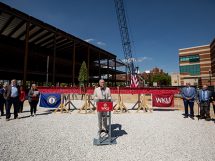
By Jacqueline Pitts, The Bottom Line
With Kentucky continuing to rank among the worst in the country in terms of legal liability climate, a state Senator and doctor says he trusts Kentucky voters with decisions that would allow them to choose whether or not they want lawmakers to set limits in certain lawsuits and make the state more competitive and attractive to business.
Senate Bill 2, filed by state Sen. Ralph Alvarado, would put a constitutional amendment on the ballot in November to let voters decide if the General Assembly should establish thresholds on non-economic jury-awarded damages—giving Kentuckians the power to determine the state’s legal liability climate.
Currently, there is no limit on these claims in the state, and awards can run into the millions of dollars.
In an interview with The Bottom Line, Alvarado said currently the ability to award damages should be in the hands of a jury but added less than 5 percent of civil liability cases end up in front of a jury in the current atmosphere.
“I think the voters of the state appreciate how difficult it is right now for businesses to do business, the potential risks of those limits, they know it affects business from coming into the state to be able to set up shop and create more jobs, and I think it is limiting. So the average voter wants to have the authority over this. And ultimately, if the authority is in the General Assembly, its in the hands of the people,” Alvarado said.
Alvarado, a doctor from Winchester, said Senate Bill 2 would also help the state’s health care community by improving practices of current providers in the state and removing barriers for professionals looking to come to the state.
“From a health care provider perspective, we want to be able to not have to practice defensive medicine all the time and to have some ability to practice academic approaches to healthcare,” Alvarado said. “Defensive medicine is bad for everyone involved, especially the patient. And when you poll this, the average citizen agrees this is an issue that’s important. The people opposed to this are…people who are benefitting from a system that has become an industry for them to make profits off the backs of Kentuckians.”
Because of the current environment, Alvarado said, many out of state law firms are preying on Kentucky’s lack of strong protections which weakens the quality of care for patients because of the fear of getting sued.
“You see the advertisements we have in our current markets. I think in Louisville in particular we have the most legal firm, trial lawyer advertisements per capita—we are number one in the country. And that kind of tells the type of climate we have created here. And unfortunately, we haven’t had any civil liability reforms, the Supreme Court acknowledges we have a problem but nothing has been done to repair that image,” Alvarado said.
“A lot of lawyers know we don’t go to trial juries anymore. So when we talk about jural rights, those juries can’t exercise those rights because they don’t hear these cases, everything gets settled because of the huge liability risks. And that’s part of the climate we have to change in our state going forward. All of our neighbors have realized this, other states have acknowledged it,” Alvarado said. “It is something that if we don’t act on, we are going to hurt ourselves. It is going to be very tough to do business and to practice medicine.”
Alvarado also added opponents of reforms point to examples of lawsuits and caps in other states and are “jumping ahead to the next bill” but Senate Bill 2 would only determine if lawmakers could have the ability to set these types of limits, and those discussions will only come if the voters approve the constitutional amendment.
Senate Bill 2 has passed through committee and is awaiting a vote by the full Senate before it would move to the House and then to the ballot in November.





















Add Comment